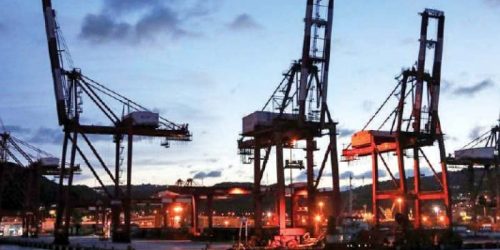ISLAMABAD:
The Port Qasim Authority (PQA) is likely to challenge the general sales tax (GST) levied by the Sindh government on the channel development cess (CDC) collected from liquefied natural gas (LNG) carrying vessels.
The previous government had imposed the cess in a bid to finance the widening of a water channel for LNG ships. PQA has collected CDC worth $47.5 million. However, the Sindh government has imposed GST on CDC, which upset the federal government.
At a meeting held last week, the Cabinet Committee on Energy (CCOE) directed the Ministry of Maritime Affairs to examine the GST on CDC in order to challenge the levy in a court of law, as done by the Civil Aviation Authority (CAA) in a similar case.
Special Assistant to Prime Minister on Petroleum Nadeem Babar drew attention of the cabinet committee to the imposition of GST on CDC by the government of Sindh. He pointed to the CAA move, which challenged the levy of a similar tax in the Sindh High Court on the plea that a provincial government could not impose any tax on a federal entity.
The special assistant suggested that the Ministry of Maritime Affairs could take necessary action as required under the law. The committee chairman agreed to the proposal.
Minister for Planning, Development and Special Initiatives Asad Umar, the CCOE Chairman, emphasised that irrespective of the widening and deepening of LNG channel, an overall analysis by the PQA was inevitable for the purpose of enhancing economic benefits for the country.
The Petroleum Division proposed that the CCOE should consider setting the PQA LNG pilotage and towage rate at a level comparable with rates of regional ports, with effect from March 2015, and it should not be more than $2 per gross registered tonnage (GRT).
The Petroleum Division pointed out that the PQA was collecting 300% higher charges compared with regional ports, which added Rs7 per million British thermal units (mmbtu) to LNG prices.
It requested the cabinet body to direct the PQA to utilise the already collected CDC for the widening and development of LNG channel, before seeking additional cess.
It also suggested that an independent evaluation should be undertaken for a competitive GRT rate post-2021 when private terminals were also likely to start functioning.
During discussion, the special assistant to the PM acknowledged that the GRT rate of Port Qasim was considerably higher and stressed that the port should develop its infrastructure through channel widening, straightening and dredging, which had not been done in the past.
As a result, the movement of other vessels was restricted when LNG vessels passed through the channel. Moreover, the absence of a turning basin for large-sized vessels was also a major impediment.
Though the required services were not available at Port Qasim, still the port infrastructure development cess was being charged. The special assistant stated that a considerable amount of CDC was already available with the PQA, which should be spent on the development of port infrastructure.
He suggested that the PQA should refrain from collecting service charges on the required facilities/ services, especially on account of pilotage and towage.
Secretary of the Ministry of Maritime Affairs, at the outset of the meeting, presented written comments on a summary prepared by the Petroleum Division and requested the committee chairman to accept them as part of the summary.
He told the meeting that the Ministry of Maritime Affairs had, in principle, no objection to the summary provided the GRT rate was determined in light of an independent evaluation and the rate should not be applied retrospectively.
He estimated that around $300 million would be required for the development of port infrastructure and the CDC collection was not enough to take up the task. “If the PQA is not able to generate revenue, the government could have to provide financial assistance,” he said.
Special assistant to the PM on revenue sought clarification about the authority for CDC imposition, saying an autonomous organisation could not impose the cess.
In response, the PQA chairman pointed out that the Gazette notification for the CDC had been issued after approval of the Economic Coordination Committee (ECC) of the cabinet.
The special assistant on revenue suggested that the PQA should not collect further cess unless the already received amount was utilised.
The CCOE considered the summary titled “Port charges reduction on LNG by PQA” submitted by the Petroleum Division and directed the Ministry of Maritime Affairs to conduct a detailed study for an optimally competitive GRT rate. The cabinet body will decide the GRT rate in light of the study. However, the rate would apply only prospectively and not retrospectively, it said.
It was of the view that the Ministry of Maritime Affairs/ PQA would utilise the already collected CDC on the development of port infrastructure, which should start immediately.
Apart from that, a sub-committee comprising the special assistant on power, maritime affairs secretary, Petroleum Division secretary and PQA chairman will look into the financial viability of channel widening and dredging work.
The sub-committee will come up with options for financing the activity including, but not limited to, imposition of cess on all or some cargoes.





